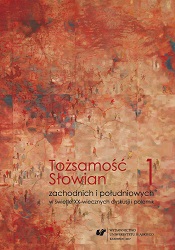Stereotyp tożsamości
Identity stereotype
Author(s): Bożena Tokarz
Subject(s): Language and Literature Studies, Studies of Literature, Theory of Literature
Published by: Wydawnictwo Uniwersytetu Śląskiego
Keywords: stereotype; identity; an individual; integrity; manipulation
Summary/Abstract: A common semantic area of the concepts of stereotype and identity determines their stigmatising property, serving equally individualisation and unification, while they differas far as axiological marking, the object and tools of cognition are concerned. The identity crisis, which was frequently announced at the end of the last century, relates to the crisis of a stereotypical conception of identity as an unchanging picture. Given that identity has a processual character and is shaped by the possessed knowledge, designation of its boundaries, i.e. their ultimate specification signifies stereotypisation by which social and political manipulation becomes possible. Possession of identity does not determine a positive evaluation of a person or of a community, whereas identity stereotypes have a clear evaluation charge. Therefore, the concept of identity, corresponding with subjectivity, integrity and stereotype is rooted in a wider social, cultural, historical and narrative context rather than solely in the moral context. Identity, therefore, is a combination of awareness with behaviour and the ability to express oneself. The subject, as an agent of the correlation of consciousness, of behavior and of expression exists in a frequent conflict with the weakness of the will ofan individual or of the will of the representatives of a community – the authority, whichleads to the phenomenon of self-deception by means of identity stereotypes.
- Page Range: 27-41
- Page Count: 15
- Publication Year: 2017
- Language: Polish
- Content File-PDF

